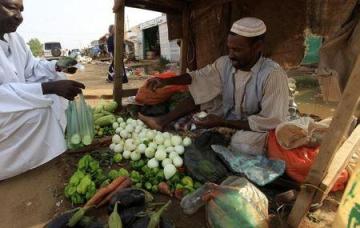Sudan’s inflation rise to 35,13% in September
October 11, 2017 (KHARTOUM) – Sudan’s Central Bureau of Statistics (CBoS) reported that inflation has increased to 35,13 % in September from 34,61 in August, a rise of 1.51%.

According to the CBoS monthly bulletin on Wednesday, the twelve commodity and service groups contributed to the rise in inflation at varying rates.
The food and beverage group contributed to the overall price rise by % 22,91 while the clothing and footwear group share was 2,55%.
The contribution of the other groups was as follows: 1,59% for the health group, 0,96% for the communications group, 0,93% for the transportation group, 0,90% for the housing, water, electricity and gas group and 1,21% for the home appliances group.
On the other hand, the education group contributed 0,64%, the miscellaneous goods and services share was 0,84% while the restaurants and hotels group contributed 1,13% and the tobacco group share was 0,53%.
The CBoS pointed out that the general price index of the vegetables has increased by16,04 points, a rise of 2,11% from August.
The highest increase in the price index for goods and services in September was registered in North Kordofan State while the lowest was registered in the North State.
Prices and services have soared in Sudan since South Sudan seceded in 2011, taking with it three-quarters of the country’s oil output, the main source of foreign currency used to support the Sudanese pound.
The Sudanese pound has lost 100% of its value since South Sudan’s secession, pushing inflation rates to record levels given that country imports most of its food.
Ordinary citizens continue to complain from cost of living increases that impaired their access to basic commodities.
Last month, the International Monetary Fund (IMF) said the economic conditions in the east African nation remain challenging in the face of persistent fiscal deficits, high inflation, and economic sanctions.
It expected that weaker demand, partly due to a reduction in energy subsidies by the government in late 2016 would limit growth to 3,2% in 2017.
According to the IMF, the increase in the inflation rate was caused by the impact of higher energy prices and rapid monetary expansion to help finance large remaining subsidies.
It also expected the fiscal deficit to widen to 2% of Gross Domestic Product (GDP) in 2017, saying Sudan’s international reserves would remain low.
Sudan hopes that the recent U.S. decision to lift the 20-year-old trade embargo would help improve the overall economic situation in the country.
(ST)
